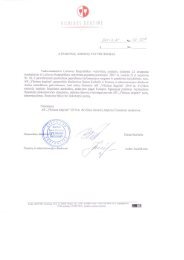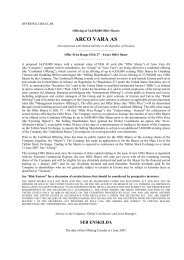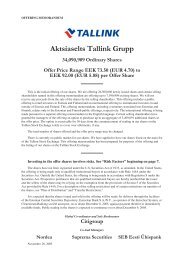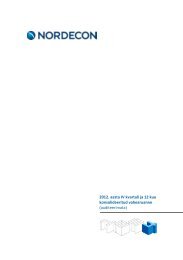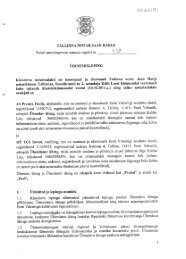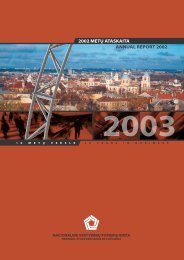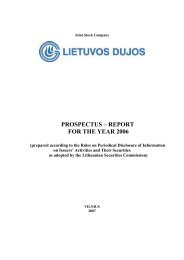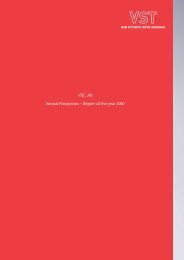AB „SNAIGĖ“ - NASDAQ OMX Baltic
AB „SNAIGĖ“ - NASDAQ OMX Baltic
AB „SNAIGĖ“ - NASDAQ OMX Baltic
You also want an ePaper? Increase the reach of your titles
YUMPU automatically turns print PDFs into web optimized ePapers that Google loves.
Consolidated annual report for year 2008<br />
PRINCIPLES/ RECOMMENDATIONS<br />
3.7. A member of the collegial body should be considered to<br />
be independent only if he is free of any business, family or<br />
other relationship with the company, its controlling<br />
shareholder or the management of either, that creates a<br />
conflict of interest such as to impair his judgment. Since all<br />
cases when member of the collegial body is likely to<br />
become dependant are impossible to list, moreover,<br />
relationships and circumstances associated with the<br />
determination of independence may vary amongst<br />
companies and the best practices of solving this problem are<br />
yet to evolve in the course of time, assessment of<br />
independence of a member of the collegial body should be<br />
based on the contents of the relationship and circumstances<br />
rather than their form. The key criteria for identifying<br />
whether a member of the collegial body can be considered<br />
to be independent are the following:<br />
1) He/she is not an executive director or member of<br />
the board (if a collegial body elected by the<br />
general shareholders’ meeting is the<br />
supervisory board) of the company or any<br />
associated company and has not been such<br />
during the last five years;<br />
2) He/she is not an employee of the company or<br />
some any company and has not been such<br />
during the last three years, except for cases<br />
when a member of the collegial body does not<br />
belong to the senior management and was<br />
elected to the collegial body as a representative<br />
of the employees;<br />
3) He/she is not receiving or has been not receiving<br />
significant additional remuneration from the<br />
company or associated company other than<br />
remuneration for the office in the collegial<br />
body. Such additional remuneration includes<br />
participation in share options or some other<br />
performance based pay systems; it does not<br />
include compensation payments for the<br />
previous office in the company (provided that<br />
such payment is no way related with later<br />
position) as per pension plans (inclusive of<br />
deferred compensations);<br />
4) He/she is not a controlling shareholder or<br />
representative of such shareholder (control as<br />
defined in the Council Directive 83/349/EEC<br />
Article 1 Part 1);<br />
5) He/she does not have and did not have any<br />
YES/NO<br />
/NOT<br />
APPLIC<strong>AB</strong>LE<br />
COMMENTARY<br />
NO Until now the independence of the Members of the Board<br />
has not been assessed, and the contents of the concept of<br />
“adequacy” of the independent Members of the Board<br />
have not been discussed.<br />
The Company has not taken any decision concerning the<br />
implementation of these provisions in the future.<br />
Prepared by U<strong>AB</strong> FMĮ „Orion Securities“ p. 42





